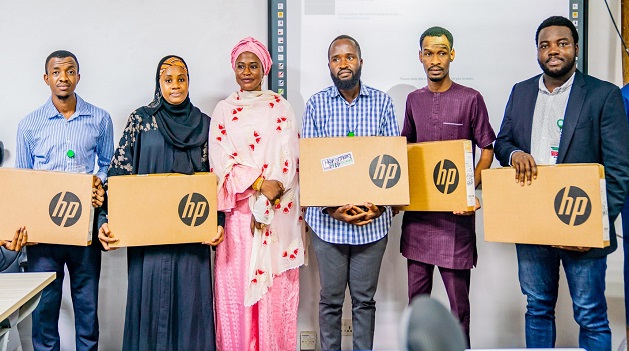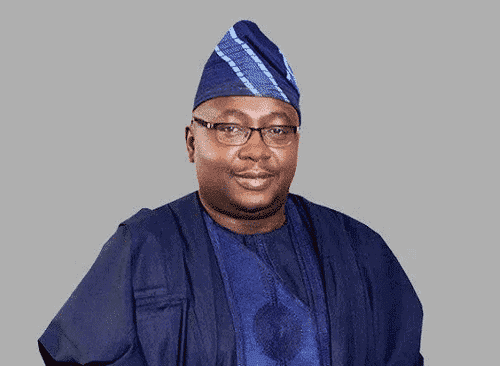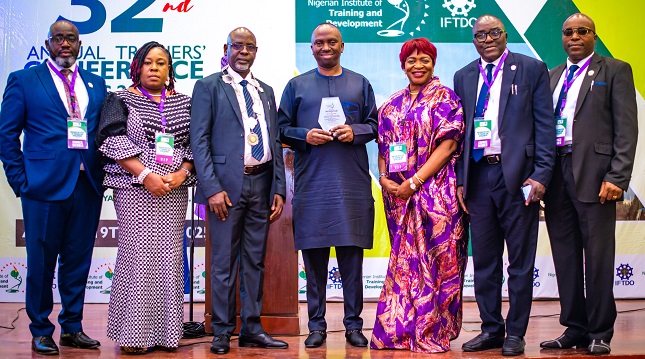News
NITDA Gives Laptops to Outstanding Learners of its Cohort 2 COURSERA Programme

Kashifu Inuwa Abdullahi, CCIE, the Director-General of the National Information Technology Development Agency (NITDA), has presented laptops to top ten learners of the cohort 2 NITDA-COURSERA Training Programme who were the first to successfully complete their professional certification.

The DG made the presentation during the November edition of the NITDA-COURSERA familiarisation webinar.
Represented by the Acting Director, Digital Literacy and Capacity Building Department, Dr Amina Sambo- Magaji, the Director-General congratulated the beneficiaries and commended them for surpassing expectations, creatively utilising the knowledge gained during the training and performing excellently.
Inuwa who noted that the promise of giving laptops as prizes to winners was to encourage healthy competition among the trainees for them to think outside the box and perform optimally in their respective areas of interest, especially as the outcome of the first batch of trainees wasn’t quite satisfactory, expressed satisfaction at the innovative ideas birthed by the learners.
“After our first batch, we realised that the competition rate was not very encouraging, so, we looked at different options, brainstormed on possible best option to increase the competition rate and one of them was the concept of giving the laptops which eventually paid off as there were timely and tangible results gotten from learners.”
“Also, we know that having a laptop will support you in actually using it as a tool for job, so, it was more of a double impact”, the DG stated.
The NITDA Boss reiterated the fact that the youthful population of the country remains one of the key competitive advantages over other nations and as such should be explored and exploited to achieve the Federal Government’s quest of making Nigeria the global talent hub.
“For us to be able to harness the potential of that competitive advantage we have in our youthful population, that is why we are undertaking a number of capacity building initiatives to make sure that Nigerians have access to the global on-demand skills”, Inuwa maintained.
According to Inuwa “most of the beneficiaries completed their professional certification in Cybersecurity, Data Analytics, and Digital Marketing”.
While presenting the laptops to the ten outstanding learners who completed their NITDA-Coursera courses, the DG encouraged them not to relent in their efforts to bridge the digital gap and come up with indigenous solutions that have global impact, adding that their expected contributions to the tech ecosystem will trigger the needed growth in the industry, the Nation’s digital economy as well as their general well-being.
Some of the beneficiaries who shared their success stories, thanked NITDA-Coursera for affording them the opportunity to learn on the platform.
They assured the organisers that they will most definitely use the transformative experience to impact on their chosen fields as well as contribute their quota by passing on the knowledge to others.
Earlier, Dr. Ahmad Yusuf Tambuwal, the Assistant Director, Digital Literacy and Capacity Building Department, NITDA, while giving an overview of the NITDA-COURSERA Scholarship Programme said Coursera is one of the world’s top online learning platforms hosting thousands of courses from some of the world’s best universities and tech companies.
According to Dr Tambuwal, “In its effort to achieve its One Million Developer and Skills target, NITDA established a 3-year learning partnership with Coursera with effect from 19 October 2022”, stressing that the partnership is designed to be implemented in six (6) Cohorts: (Cohort 1 – Cohort 6).
“Learners in each Cohort will receive full access Coursera licenses for self-learning and professional development over a six (6) months duration and every 6 months, at least 4000 learners are graduated from the programme while a new set of learners are onboarded and invited to join the platform”.
“NITDA organises monthly webinars to give learners direct access to Coursera and NITDA support teams, interaction and networking, Q&A, guest lectures etc.”, Tambuwal noted.
NITDA, he explained further, implements a license management policy to ensure full utilisation of available licenses.
“If a license is not being utilised, several reminder emails are sent to the learner, and if still not being used, it is eventually revoked & re-allocated”.
“So far, the first set of 4000 learners In Cohort 1 have already graduated, and Cohort 2 learners will be graduating at the end of December 2023”, Dr Tambuwal added.
The hybrid event which witnessed over 500 participants joining the webinar also featured a brief on how the NITDA-COURSERA platform works by the Coursera representative and host, Khaled Kokhon.
The NITDA-Cousera partnership is aimed at achieving some key objectives which include: empowering twenty-four thousand (24,000) Nigerians with digital & developer skills in 3 years, empowering Nigerian citizens with job-ready skills and create a large pool of IT talents for the local and global markets, fostering innovation and supporting start-ups with IT knowledge & skills needed to build real-life solutions.
It is worthy to also mention that since the start of Cohort 2 in June 2023, learners have spent over 10,000 hours learning on Coursera every month as July witnessed over 20,000 learning hours.
So far, 12,664 Courses have been completed by the learners since the programme started.
News
Nigeria Taps $190M JICA Loan to Power Underserved Communities

Nigeria is seeking a $190 million renewable energy loan backed by the Japan International Cooperation Agency (JICA), according to Adebayo Adelabu, minister of power.

Minister Adebayo-Adelabu
In a statement released by the ministry on Saturday, Adelabu disclosed the plan during the 9th Tokyo International Conference on African Development (TICAD 9) in Yokohama, Japan, where the Nigerian delegation led by President Bola Tinubu held high-level discussions on power, infrastructure, and industrial transformation.
Adelabu said the facility is aimed at scaling distributed renewable energy solutions across underserved communities. “This builds on the recently launched $750 million World Bank Distributed Access through Renewable Energy Scale-up (DARES) programme under the Mission 300 Compact, which aims to bring clean and reliable electricity to more than 17 million Nigerians,” the ministry said.
The minister also held talks with Japanese corporations including Toshiba, Hitachi, Japan’s transmission and distribution corporation, and energy exchange corporations. Discussions focused on strengthening transmission infrastructure, improving operational efficiency, and cutting system losses.
The ministry said these engagements build on recent Federal Executive Council approvals for counterpart funding of N19.08 billion to unlock a $238 million loan from JICA. The loan will finance the expansion of the national grid, including the construction of over 200km of new 330kV and 132kV double circuit lines, six new substations, and extensions to existing facilities.
Three substations funded through a $32 million JICA grant—located in Apo (FCT), Keffi (Nasarawa), and Apapa (Lagos)—are also set for commissioning, a move expected to boost supply reliability for households, industries, and business hubs, including the Lagos Port.
Speaking during a panel session themed “HICKARE Africa: Harnessing Innovation, Co-creation, and Knowledge for Accessible and Resilient Energy for Africa”, Adelabu highlighted Nigeria’s energy gap, noting that only 55–60 percent of the population currently has access to electricity, much of which is unreliable.
He outlined the government’s approach to expand grid access in urban areas while accelerating off-grid solutions such as solar mini-grids and standalone systems in rural and peri-urban communities. He pointed to challenges including limited access to affordable capital, high costs for rural households, and the under-utilisation of productive-use equipment.
Despite these hurdles, the minister reaffirmed the government’s commitment to reforms through supportive policies, private-sector collaboration, and increased local manufacturing of renewable energy components.
Adelabu commended JICA and the Japanese government for their “long-standing support” to Nigeria’s power sector, praising their contributions to infrastructure, training, technical studies, and financing. He expressed optimism for deeper partnerships between both countries in driving Nigeria’s energy transition.
News
Banigbe, T2 CEO says Nigeria’s Growth Hinges on Learning, Innovation, and Afrocentric Content

Obafemi Banigbe, chief executive officer of T2, has stressed that Nigeria’s long-term economic transformation depends on continuous upskilling, digital learning, and workforce adaptability.

Speaking as Special Guest at the 32nd Annual Trainers’ Conference (ATC 2025) of the Nigerian Institute of Training and Development (NITAD), held recently at the Shehu Musa Yar’Adua Centre, Abuja, Banigbe warned that without deliberate investment in human capital and technology-driven innovation, the nation risks lagging behind in a rapidly evolving global economy.
Drawing from personal reflections, practical insights, and a forward-looking vision, Banigbe urged Nigerians to reimagine approaches to learning, work, and growth in order to build a prosperous, inclusive, and innovation-led society.
He emphasized that the traditional model of “learning once and working forever” is obsolete.
“With Nigeria projected to become the world’s third most populous nation by 2050, and 70 percent of its citizens under 30, the need for continuous upskilling, digital learning, and adaptability is not optional, it is existential,” he stated.
Banigbe underscored the importance of democratizing access to digital tools, ensuring that every Nigerian child has the same opportunities as peers in developed economies.
He called for the creation of Afrocentric educational content, including culturally relevant cartoons, to help children learn science, mathematics, and history through familiar cultural references rather than foreign identities that disconnect them from their environment.
He also urged a national shift away from a culture that prizes certificates and training hours to one that rewards competence, innovation, and problem-solving.
He envisioned a civil service and workforce driven by solutions rather than processes, stressing that while artificial intelligence may analyze and automate, it cannot dream, uphold ethics, or create new nations, a reminder of the enduring human advantage.
Banigbe further encouraged adoption of cost-effective training models such as online platforms, virtual cohorts, and open-source learning, while acknowledging the continued value of global exposure where local resources fall short.
During an interactive question and answer session, he addressed concerns around affordability, accessibility, and the role of self-driven digital education in shaping Nigeria’s future-ready workforce.
He assured participants that T2 itself is on a path of transformation, committed to delivering world-class services as a proudly Nigerian brand.
In recognition of his contribution to national dialogue and thought leadership, the President of NITAD, James Bulus, presented Banigbe with an Award of Excellence.
News
NACCIMA, TETFund Forge Alliance to Boost Innovation, Skills, Economic Growth

The Nigerian Association of Chambers of Commerce, Industry, Mines and Agriculture (NACCIMA) and the Tertiary Education Trust Fund (TETFund) have agreed to a new strategic partnership aimed at driving innovation, entrepreneurship, and workforce readiness.

Led by its National President and Chairman of the Organized Private Sector of Nigeria (OPSN), Engr. Jani Ibrahim, a high-level NACCIMA delegation visited the TETFund headquarters in Abuja today.
The team was received by the Executive Secretary of TETFund, Arc. Sonny S.T. Echono, during what both parties described as a milestone engagement.
Discussions during the meeting focused on collaborative initiatives including entrepreneurship development, support for the green economy, commercialization of academic research, industry–academia synergy, and skills development to better equip graduates for the evolving demands of the labour market.
A key outcome of the meeting was the mutual agreement to sign a Memorandum of Understanding (MoU) and establish a NACCIMA–TETFund Joint Technical Committee that will oversee the implementation of agreed initiatives.
Both sides also expressed commitment to developing additional partnership frameworks that will bolster Nigeria’s competitiveness and economic resilience.
Also present at the engagement, Prof. Umar Bindir lauded the collaboration, highlighting the need for structured, long-term partnerships between academia and the private sector to generate practical solutions to Nigeria’s socio-economic challenges.
Arc. Echono, in his remarks, praised NACCIMA’s leadership in promoting enterprise and innovation, and reaffirmed TETFund’s readiness to work closely with the Organized Private Sector to foster research, innovation, and economic transformation.
This collaboration positions NACCIMA as a key driver of national development, helping to bridge the gap between education, enterprise, and policymaking, while empowering young Nigerians and strengthening the foundation of the country’s knowledge economy.

 E-Financial1 day ago
E-Financial1 day agoFBNQuest Merchant Bank Facilitates Landmark ₦5Bn Commercial Paper Programme for Accion Microfinance Bank

 E-Business1 day ago
E-Business1 day agoNDPC Begins Probe of Banks, Others for Data Breaches

 Telecom1 day ago
Telecom1 day agoDigital Realty Commits to Africa’s Digital Transformation @ Launch of LKK2 Data Center

 Telecom1 day ago
Telecom1 day agoIntel–U.S. Partnership Reshapes Semiconductor Landscape with Historic Equity Agreement

 E-Financial1 day ago
E-Financial1 day agoUBA to Deepen Financial Inclusion, Boost Savings’ Culture with Super Savers’ Promo

 Telecom1 day ago
Telecom1 day agoNITDA Alerts Nigerians to eSIM Security Flaw Deployed to Hijack Devices Worldwide

 E-Financial1 day ago
E-Financial1 day agoNigeria Leads Africa in Stablecoin Adoption with $22Bn in Transactions

 E-Financial1 day ago
E-Financial1 day agoFidelity Bank Resumes Intl Transactions on Naira Debit Cards



























